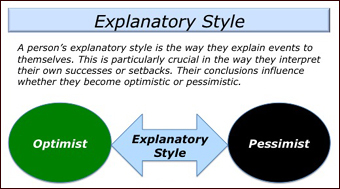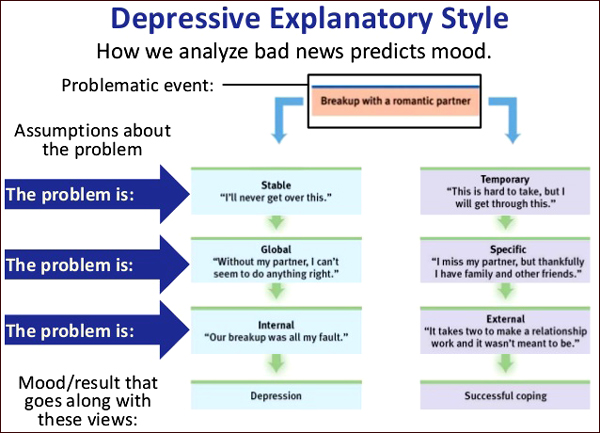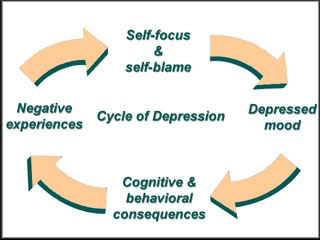|
|
|

|
 Clinical Therapy - The Power of Social Cognition Clinical Therapy - The Power of Social Cognition
|

|
Ψ Depression is the most heavily researched psychological disorder. Depression affects 10% of men & nearly twice that many women.
Ψ Depressive Realism is the tendency for mildly depressed people to make judgments that are typically more accurate than people who are not depressed. Those who are not depressed often make judgments & attributions that are self-serving. For example, if you did well on a psychology test you might say that you did so because you're a genius & know everything about psychology. This would be a pretty self-serving attribution, wouldn't you say? But a mildly depressed person who got an A might make a more accurate attribution such as saying it was not because she is a genius, but because she studied well or the test was particularly easy. Your way might make you feel better, but it also might be less accurate.
Ψ Explanatory style is a psychological attribute that indicates how people explain to themselves why they experience a particular event, either positive or negative.

Ψ Psychologists have identified three components in explanatory style:
• Permanent (stable). People may see the situation as unchangeable, e.g., "I always lose my keys" or "I never forget a face".
• Pervasive (global). People may see the situation as affecting all aspects of life, e.g., "I can't do anything right" or "Everything I touch seems to turn to gold".
• Personal. People experiencing events may see themselves as the cause; that is, they have internalized the cause for the event. Example: "I always forget to make that turn" (internal) as opposed to "That turn can sure sneak up on you" (external).

Ψ The vicious cycle of depression loops negative experiences, self-focus & self-blame, depressed mood, and cognitive & behavioral consequences
in continuous feedback.

Ψ Loneliness is an emotional state in which a person experiences a powerful feeling of emptiness & isolation. Loneliness does not conincide with being alone (solitude). Loneliness is a feeling of being cut off, disconnected & alienated from other people. The lonely person may find it difficult or even impossible to have any form of meaningful human contact. Lonely people often experience a subjective sense of inner emptiness or hollowness, with feelings of separation or isolation from the world.
Ψ Shyness reinforces loneliness, both produce depression. Depression directly feeds back into both
the shyness & loneliness which further increase the depression which ....
Ψ Common symptoms of loneliness:
• Believing that 'everyone else' has friends
• Feeling unloved by those around you
•
Feeling socially inadequate & unskilled
• Feeling unloved by those around you
• Being convinced there is something wrong with you
• Being unable to share your private concerns
• Feeling that no one understands one's situation
• Feeling different & alienated from those in your surroundings
• Feeling reluctant to attempt to change, or try new things
• Feeling 'empty', depressed, or even contemplating suicide
Ψ Self Presentation Theory
assumes that our behavior aims to create a desired impression. We feel anxious
when we try to impress others but doubt our ability to do so. We feel most anxious when we are;
• self-conscious.
• in novel or
unstructured situations.
• focused on something central to our self-image.
• with powerful, high-status people, e.g.
upper management.
Ψ Self-handicapping involves hindering one's own performance in order to have an excuse for failing. Labeling oneself as anxious, shy, depressed, or under the influence of alcohol can provide an excuse for failure.
Ψ Social-Psychological Approaches to Treatment
• Induce internal change through external behavior
• Break vicious cycles with:
• Social
Skills Training Social skills training is a general term for instruction
conducted in (behavioral) areas that promotes more productive/positive
interaction with others.
• Explanatory
Style Therapy Cognitive Therapy can be used to modify
explanatory style.
Social Psychology
Robert C. Gates
|

|
|
















